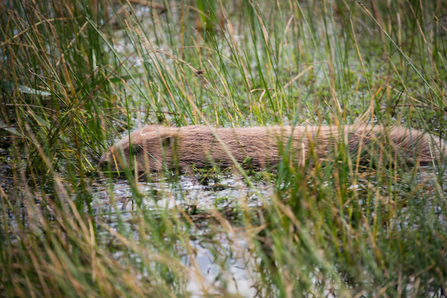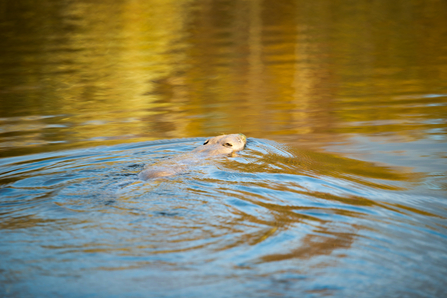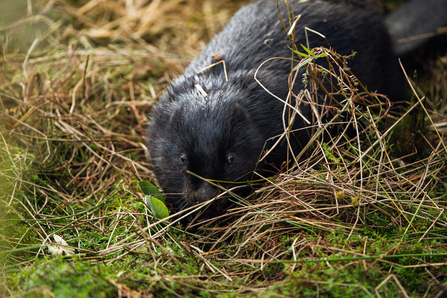Beaver release - dad released (https://youtu.be/WEO_q7gfM2k)
Video © Nottinghamshire Wildlife Trust
One of the released beavers venturing into new territory - Photo by Kirsty James
Beaver release - dad released (https://youtu.be/WEO_q7gfM2k)
Video © Nottinghamshire Wildlife Trust
In the week that Nottinghamshire Wildlife Trust released an eighth beaver into a special enclosure at its Idle Valley Nature Reserve near Retford, the largest group yet released in England; and less than two months since Derbsyhire Wildlife Trust brought beavers to back to the county for the first time in centuries, The Wildlife Trusts are asking the public to support plans that could see beavers released into the wild in England.

Photo © Hattie Lavender
To date, the only officially sanctioned beavers living wild in the UK are in Scotland and along the River Otter in Devon, where Devon Wildlife Trust has worked with the local community to monitor the animals over several years.
The Wildlife Trusts believe beavers should be allowed to return to the wild across the UK and expand their range naturally. For the beaver strategy to achieve its full potential for nature and climate, they are calling on the Government to:

Photo © Hattie Lavender
Beavers are considered a ‘keystone species’, which means they have a highly positive impact on their environment. The animals have a unique ability to restore and maintain important wetland habitats, which are crucial for supporting other wildlife and helping to tackle climate change.
The Wildlife Trusts are at the forefront of beaver reintroduction in the UK and have released a record number of beavers in 2021 – twenty years after they brought the first-ever beavers back to Britain.
Paul Wilkinson, Chief Executive of Nottinghamshire Wildlife Trust says:
“Beavers are amazing animals and the results of several trials show how reintroduction can have a positive impact for nature, climate, and people too. Beavers can help to improve water quality, benefit other species, reduce flood risk and, by creating new wetlands, contribute to carbon storage as well.”
“We’re delighted to have beavers in our new enclosure at Idle Valley but ultimately, we want to see free-living beavers across the UK – helping to restore nature and tackle the climate emergency. The Wildlife Trusts have the knowledge and expertise of managing these animals effectively and a wealth of experience working with landowners and communities to make sure any issues can be resolved quickly. If the UK is serious about putting nature into recovery, we need to have beavers in the wild.”

Photo © Hattie Lavender
5 years of research by Devon Wildlife Trust shows that:
Once the consultation closes on 17th November, the Government will publish a strategy in response, setting out the framework for future beaver reintroductions and support for landowners who make space for beavers on their land.
The Wildlife Trusts are asking people to respond to the consultation via their petition.